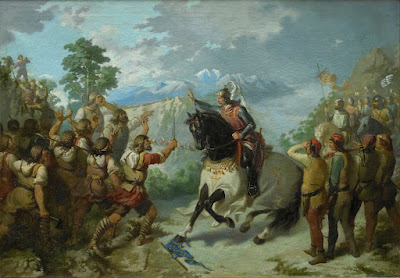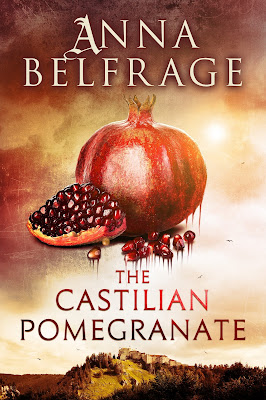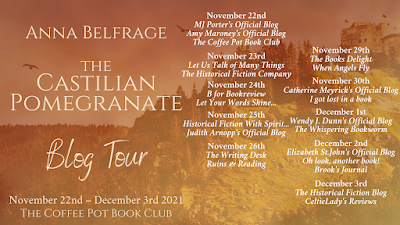(The Castilian Saga, Book 2)
 |
| Welcome to my Blog! Wander through wonderful worlds real and fictional, meet interesting people, visit exciting places and find a few good books to enjoy along the way! |
How an obscure medieval figure grew into a central character – or falling in love with Mr Anonymous
When I am writing a book set in a specific period and place, I usually spend a lot of time reading up about events that happened before my portrayed time and close to my chosen geographical setting. When it came to The Castilian Pomegranate, I knew the year was 1285 and that my protagonists –more or less forcibly exiled from England by a distraught Queen Eleanor—were somewhere in Spain.
Now, Spain as we know it did not exist in 1285. Instead, present day Spain was home to several states and kingdoms, with Castile and Aragon being the principal Christian kingdoms. And as Robert FitzStephan and his wife, Noor, had been charged with the mission to deliver documents to the King of Aragon, well it followed that once they’d made it over the Pyrenees, they set off towards… Ah yes: one of the problems of writing about medieval courts: they NEVER stayed in one place!!!! The Kings of Aragon had palaces all over the place, but their main residences were in Zaragoza, Barcelona and Girona. Except that in the autumn of 1285, Girona was in French hands.
Let us back up a little: what were the French doing in Aragon? Turns out, the French king, Philippe III, was heading a crusade into Aragon, determined to wrest the crown from his excommunicated former brother-in-law Pedro III. Not, I’d hazard, out of any major religious devotion, but because Philippe III wanted to punish Pedro for having recently ousted Philippe’s uncle, Charles d’Anjou, from the kingdom of Sicily.
Ha: I can see you all shaking your head. Yes, politics in the 13th century was as complicated as it is in our day, but as a very brief recap let’s just say Charles d’Anjou launched a campaign against Sicily some decades earlier. The then king of Sicily, Manfred Hohenstaufen, was killed in battle and Charles took the further precaution of blinding Manfred’s surviving sons before locking them up somewhere. Problem was, Manfred also had a daughter, Constanza, and this young woman had recently married Pedro of Aragon.
 |
| the Battle of Benenvento |
So when Pedro invaded Sicily, he did so to claim these lands on behalf of his wife (who was with him during the campaign, eagerly cheering him on). Obviously, Charles d’Anjou was not happy. Neither was the pope, seeing as the papacy had supported Charles’ original invasion and now stood to lose relevant incomes. The pope decided to retaliate by excommunicating Pedro. And in France, Philippe decided to take up arms—with the blessing of the pope, hence that this whole endeavour is known as The Aragonese Crusade.
In 1284, Philippe started moving south. He was welcomed with open arms by Pedro’s younger brother, Jaume. This disgruntled brother was not at all happy with the rather measly inheritance his father had given him: the Balearic islands, Montpellier, the county of Roussillon with Perpignan as its capital was just not enough, not when Pedro had inherited the Aragonese heartlands! (IMO, Jaume Sr—dad to Pedro and Jaume Jr—should not have split his lands up at all) So Jaume was more than delighted to offer Philippe his support—well, not that he ever went as far as riding with the French, but he was happy to cheer them on as they set off towards the passes over the Pyrenees.
Fortunately for Pedro, there were some men in Roussillon who remained loyal to Aragon. One of them is the man known as “the Bastard of Roussillon”. It’s interesting, isn’t it, that we know of this man’s heroic acts (more of that later), we know he was illegitimate and we even know who his father is—but his name has been forever erased from the annals of history.
Now, as a writer of historical fiction, peeps like this anonymous bastard are like gold nuggets: they existed, they are even mentioned in a roll or two, but we know absolutely nothing about them beyond those events that earned them a mention. This allows me to invent a life for them—and in the case of Mr Anonymous, I have also taken the liberty of giving him a future beyond 1285.
So, what do we know of this enigmatic man? Well, for starters, we know his father was Nuño Sanchez, Count of Rousillon. Nuño, in turn, was the son of Sancho, Count of Provence, who was the younger brother of Alfonso II of Aragon. So, our anonymous bastard had royal blood in his veins, and as the people of the time were fond of patronyms, I think we can conclude he was known as XX Nuñez. I’m not entirely sure his father would have named him Sancho—maybe that was a name he was holding on to for a much desired legitimate son that never happened. In my book I have called our unknown bastard Nuño Nuñez – for the simple reason that there already is a central Sancho in the story.
Not only do we know his antecedents on his paternal side, we also know that the Bastard of Roussillon must have been over forty years in 1284 as his father died in 1241 or so. So, this is an experienced man, a man of some wealth and influence and, probably, relatively experienced in warfare. After all, any young man desiring to learn how to fight in this part of the world could always ride with the Castilians or Aragonese as they did battle with the Moors.
Finally, we have reasons to suspect our unknown bastard had his home somewhere close to the little town of Elne, as this is where he made a stand against the French. Yup. One determined man with whatever followers he could assemble decided to stop the French from reaching the passes over the Pyrenees. It’s a bit like Thermopylae, a small group of brave men facing a gigantic army – Philippe was travelling with close to 30 000 men.
Obviously, the odds were against our Nuño. But for some weeks, he held out, buying King Pedro time. And then, the French overwhelmed the resistance and Philippe decided a severe punishment was in order. In Nuño’s own words:
Beside him, Nuño shifted on his feet and lifted his face to the sun.
“My people were never buried,” he said, his voice hoarse with disuse. He laughed bitterly. “A house of the Lord became their tomb.” He closed his eyes. “It burned. They rounded them up and forced them into the cathedral before setting it on fire, and the sounds . . .” He rocked from side to side, hands pressed to his ears. “They made me watch,” he continued. “They held me and forced me to hear them scream, hear their pleas for mercy. And when the roof gave—” He shuddered and crossed himself. “A wail, a sound so terrible it tore my soul apart, and then there was silence.”
“They have paid for their sins,” Robert said.
“Paid? How can you pay for letting infants, children and women die like that? A curse on the French, a curse on Philippe and his sons, but most of all a curse on that accursed Jaume, betrayer of his people and his brother.” He held out his shaking hands, covered in healed burns. “I wrested lose. I tried to get at them, but it was too late, and there was nothing to find, no one to save.” He groaned. “My woman. Our son.” He turned to face the north again. “I just want to die,” he added softly, his voice cracking.
Robert had no notion what to say, so he stood in silence beside the equally silent Nuño. Daylight waned, and still they stood there until at long last Nuño looked at him. “God will have welcomed them into His heaven,” he said, and there was an entreaty in his gaze, a wobble to his voice.
“Of course,” Robert replied. “Innocents butchered before the image of God rise like angels towards Him.”
The cathedral in Elne burned and burned, while the papal legates and priests that travelled with Philippe did nothing to intercede. After all, the French king was doing God’s work, right?
Huh. For some reason, I suspect God disagreed. Yes, Philippe led his army into Aragon, and yes, he besieged Girona and won the city after some months, arranging for his younger son—yet another Charles—to be crowned in Girona’s cathedral as the new king of Aragon. But then the tides of fortune turned, and by the end of the Aragonese Crusade, Philippe III was dead as was the vast majority of his army.
 |
| Driving the French out of Aragon Public Domain Pere_el_Gran_al_Coll_de_Panissars by Bartomeu Ribo Terriz |
As for Nuño, there is a mention of him in one of the royal rolls of Aragon—still nameless—and then there’s nothing. Which, of course, is why I have him joining my Robert and Noor as they travel further into the Iberian peninsula there to handle all sorts of challenges, always with Nuño at their side. And when things come to a head, Nuño will yet again prove himself brave and loyal—no matter what the cost may be!
ABOUT THE BOOK
An enraged and grieving queen commands them to retrieve her exquisite jewel and abandon their foundling brat overseas—or never return.
Robert FitzStephan and his wife, Noor, have been temporarily exiled. Officially, they are to travel to the courts of Aragon and Castile as emissaries of Queen Eleanor of England. Unofficially, the queen demands two things: that they abandon Lionel, their foster son, in foreign lands and that they bring back a precious jewel – the Castilian Pomegranate.
Noor would rather chop off a foot than leave Lionel in a foreign land—especially as he’s been entrusted to her by his dead father, the last true prince of Wales. And as to the jewel, stealing it would mean immediate execution. . .
Spain in 1285 is a complicated place. France has launched a crusade against Aragon and soon enough Robert is embroiled in the conflict, standing side by side with their Aragonese hosts.
Once in Castile, it is the fearsome Moors that must be fought, with Robert facing weeks separated from his young wife, a wife who is enthralled by the Castilian court—and a particular Castilian gallant.
Jealousy, betrayal and a thirst for revenge plunge Noor and Robert into life-threatening danger.
Will they emerge unscathed or will savage but beautiful Castile leave them permanently scarred and damaged?
Trigger Warnings:
Sexual content, violence
Buy Links:
This novel is available on #KindleUnlimited
Universal Link: http://myBook.to/POMEGRANATE
Amazon UK: https://www.amazon.co.uk/dp/B09FP655ZH
Amazon US: https://www.amazon.com/dp/B09FP655ZH
Amazon CA: https://www.amazon.ca/dp/B09FP655ZH
Amazon AU: https://www.amazon.com.au/dp/B09FP655ZH
ABOUT ANNA
Had Anna been allowed to choose, she’d have become a time-traveller. As this was impossible, she became a financial professional with two absorbing interests: history and writing. Anna has authored the acclaimed time travelling series The Graham Saga, set in 17th century Scotland and Maryland, as well as the equally acclaimed medieval series The King’s Greatest Enemy which is set in 14th century England.
Anna has also published The Wanderer, a fast-paced contemporary romantic suspense trilogy with paranormal and time-slip ingredients.
The Castilian Pomegranate is the second in her “Castilian” series, a stand-alone sequel to her September 2020 release, His Castilian Hawk. Set against the complications of Edward I’s invasion of Wales, His Castilian Hawk is a story of loyalty, integrity—and love. In The Castilian Pomegranate, we travel with the protagonists to the complex political world of medieval Spain, a world of intrigue and back-stabbing.
Her most recent release prior to The Castilian Pomegranate is The Whirlpools of Time in which she returns to the world of time travel. Join Duncan and the somewhat reluctant time-traveller Erin on their adventures through the Scottish Highlands just as the first Jacobite rebellion is about to explode!
All of Anna’s books have been awarded the IndieBRAG Medallion, she has several Historical Novel Society Editor’s Choices, and one of her books won the HNS Indie Award in 2015. She is also the proud recipient of various Reader’s Favorite medals as well as having won various Gold, Silver and Bronze Coffee Pot Book Club awards.
Reviewed on Discovering Diamonds
Social Media Links:
Website: www.annabelfrage.com
Twitter: https://twitter.com/abelfrageauthor
Amazon Author Page: https://www.amazon.co.uk/Anna-Belfrage/e/B008C89JB8
follow the tour
Twitter Handles: @abelfrageauthor @maryanneyarde
Hashtags: #HistoricalFiction #HistoricalRomance #Medieval #medievalspain #CoffeePotBookClub #BlogTour
*** ***
You might Also like
Books By Helen Hollick
Website: https://helenhollick.net/
Amazon Author Page: https://viewauthor.at/HelenHollick
 |
| A Mirror Murder #1 in the Jan Christopher Cosy Mystery Series set in a 1970s London library and now... Episode 2! A Mystery of Murder 1971 Jan and her boyfriend DS Laurie Walker spend Christmas in Devon (featuring an owl, a teddy bear, some pigs - and a murder to solve!) https://viewauthor.at/HelenHollick |
| 1066 Turned Upside Down - an anthology of alternative stories |
Includes a story by Anna Belfrage!









No comments:
Post a Comment
Thank you for leaving a comment - it should appear soon. If you are having problems, contact me on author AT helenhollick DOT net and I will post your comment for you. That said ...SPAMMERS or rudeness will be composted or turned into toads.
Helen